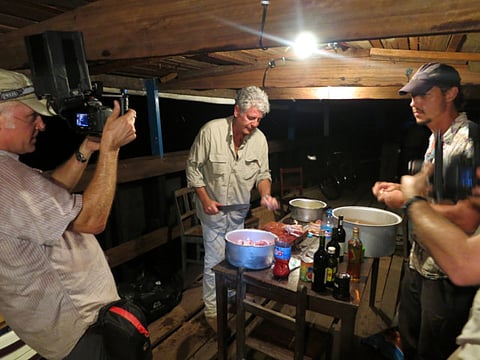Anthony Bourdain: I choose where I go
The chef’s hit CNN show, which has taken him to Congo, Libya and Canada, and has been renewed for a second season

Anthony Bourdain gets to travel around the world having adventures and eating great food. His new network, CNN, has already ordered another season of Parts Unknown.
The New York chef put down his knife several years ago and hit the road, exploring the world’s most thrilling locations in search of unique food and the people that cook it. This season has taken him to Congo, post-Gaddafi Libya and the more sedate charms of Canada. The final episode of the season is set in Congo; the second season of the show premieres in September.
Q. You’ve always picked where you want to go?
A. That’s the only way it happens. They’re historical obsessions, places that I’ve seen as a location in a film or read about, that always seemed intriguing. Or there’s sheer self-indulgence, 100 per cent food porn. Any of those would be reason enough.
Q. The new show seems more CNN than Food Network — is that your preference?
A. I’m free to be food-oriented or not, depending on where the journey takes me. Most importantly, they have the boots on the ground, the experience and the infrastructure to allow me to go to places such as Congo and Libya and other potential conflict zones.
Q. Do you have bodyguards?
A. We do not travel with armed bodyguards. But we do have people with a lot of experience in those places who are very good at assessing an ever-changing situation and saying, “Now’s the time to get back in the van” or “Now’s the time to leave the country” or “Here, let me set that leg for you”. If we suddenly find ourselves in a situation such as in Libya, where we do need armed bodyguards, we hire local guys.
Q. Aside from when you taste eyeballs or fresh hot monkey brains, what you enjoy eating in most cultures seems to be street food: veggies in broth with some meat and spices.
A. I think that’s real cooking.
Q. What changes when you go up the economic ladder?
A. I’m excited by any food that’s prepared by someone who’s proud of what they’re doing, who puts a personal imprint on food. There’s always a story, be it a street stall or a 3-star Michelin, and if it’s interesting, I’m going to enjoy it.
Q. So you’re not against 3-stars?
A. If it’s antiseptic, highly technically beautiful food, with no story and no personality behind it, with nobody talking to you, I’m not that interested.
Q. What’s the most creative part of cooking?
A. The roots of creativity are hungry people trying to figure out how to take something that’s not particularly fresh or tender and transform it into something delicious that everyone will love.
Q. Where would you eat your last meal?
A. Jiro Ono in Tokyo.
Q. You travel and dine professionally, which is what most people do for fun. So what do you do in your time off?
A. I stay in one place with my family and cook barbecues, steamer clams, corn on the cob.
Q. Is that tough since you’re pretty much a workaholic?
A. Yes, I’m a guy who should not have a lot of free time. But when it comes to vacation, I like to pull the plug completely. It’s all about my daughter — I’m no longer the star of my own movie.
Q. There could have been a Bar Bourdain, a Cafe Tony perhaps.
A. Yes, the product line, the pots and pans, the kitchen clogs, the knives — there could have been all those things.
Q. So why didn’t you go down that road?
A. Vanity. I just don’t want to be that guy.
Q. Why not? Mario Batali seems to be having fun.
A. Mario’s maybe the one guy — they’re all good products and his restaurants are great — but I’m not Mario.
Q. A lot of chefs are philanthropic around food, so how did you come to choose a school dedicated to reading and writing?
A. I was introduced to the Bronx Academy by my long-time agent and close friend. It took no convincing — a brief summary of what the organisation does and where their focus is — was enough to get me to one of these.
And once I met the students and learnt more about what they’re doing and how successful they’ve been at it, it quickly became my passion.
— Washington Post
